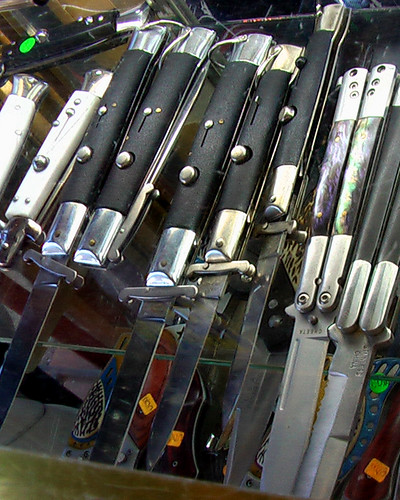J.D. Tuccille summarizes a (surprising) court decision in Massachusetts which struck down a state law banning switchblade knives:

“IMGA0174_tijuana” by gregor_y is licensed under CC BY-SA 2.0 .
The Second Amendment to the United States Constitution undisputedly protects the individual right to own and carry firearms for self-defense, sport, and other uses. But the amendment actually says nothing about guns; it refers to “the right of the people to keep and bear Arms”, of which firearms are just one example of what dictionaries define as “a means (such as a weapon) of offense or defense”. In Massachusetts, last week, that resulted in a decision by the state’s highest court striking down a law against switchblade knives.
Protected by the Second Amendment
“We conclude switchblades are not ‘dangerous and unusual’ weapons falling outside the protection of the Second Amendment,” wrote Justice Serge Georges Jr. for the court in an opinion in Commonwealth v. Canjura that drew heavily on two landmark U.S. Supreme Court cases: Bruen (2022) and Heller (2008). The decision found the state’s ban on switchblade knives unconstitutional and dismissed charges against the defendant.
The case involved a 2020 dispute between David E. Canjura and his girlfriend, during which Boston police officers found a switchblade knife on Canjura while searching him. As is often noted, “everything is illegal in Massachusetts” and “a switch knife, or any knife having an automatic spring release device” is only one of a long list of weapons proscribed under state law. Canjura was accordingly charged.
Such absolute prohibitions on arms aren’t permitted in the wake of the Heller decision, so Canjura and his public defender, Kaitlyn Gerber, challenged the ban on switchblades, citing the federal decisions. They also relied on Jorge Ramirez v. Commonwealth (2018) in which the Massachusetts Supreme Judicial Court overturned a similar prohibition on stun guns on Second Amendment grounds.
“We now conclude that stun guns are ‘arms’ within the protection of the Second Amendment. Therefore, under the Second Amendment, the possession of stun guns may be regulated, but not absolutely banned,” the court found in that case.
Canjura required similar analysis based on the same earlier decisions, this time with Ramirez in the mix.
The Second Amendment Protects All “Bearable Arms”
Citing Heller, Justice Georges pointed out, “the Second Amendment extends, prima facie, to all instruments that constitute bearable arms, even those that were not in existence at the time of the founding”. Importantly, though, knives and other bladed weapons have a long history, extending back well before the birth of the country.
“A review of the history of the American colonies reveals that knives were ubiquitous among colonists, who used them to defend their lives, obtain or produce food, and fashion articles from raw materials,” commented Georges. Folding knives, in particular, grew in popularity to the point they became “almost universal”. The court saw no significant difference between the many types of folding knives used over the centuries and spring-assisted varieties developed somewhat more recently, finding “the most apt historical analogue of a modern-day switchblade is the folding pocketknife”.



